Medical Binder Printables To Keep You Organized
Using medical binder printables to create a comprehensive health binder can help alleviate stress and keep you organized. Whether in an emergency or simply referencing past medication information, you’ll be prepared.

- Written by Michael Santiago, CRPC™
Michael Santiago, CRPC™
Senior Financial Editor
Michael Santiago, a senior financial editor, joined RetireGuide in 2023. With over 10 years of professional writing and editing experience, he brings a wealth of expertise in creating content for diverse industries, including travel and healthcare. Having traveled to more than 40 countries across five continents and lived in Europe and Asia for several years, Michael's global perspective enriches his work. He combines his strong writing skills, editorial judgment and passion for crafting accurate and engrossing content to enhance the user experience on RetireGuide.
Read More- Edited By
Lamia Chowdhury
Lamia Chowdhury
Financial Editor
Lamia Chowdhury is a financial content editor for RetireGuide and has over three years of marketing experience in the finance industry. She has written copy for both digital and print pieces ranging from blogs, radio scripts and search ads to billboards, brochures, mailers and more.
Read More- Published: October 7, 2021
- Updated: May 7, 2025
- 9 min read time
- Edited By
Keeping an updated binder with compiled medical information can alleviate tension for you and your loved ones. Though not a pleasant thought, if something were to happen to you, be it a broken bone or a stroke, your loved ones, doctors and emergency responders would have all the information they need to help you.
When there is no emergency, having a medical binder is a handy way to keep your health information organized in one place. This can eliminate stress over finding medical history, insurance information or other details needed to keep you in good health.
Use the medical binder printables below to get your health information gathered so it’s ready when you need it most.
What Is a Medical Binder?
A medical binder contains a wide range of personal health information, including medication history and current health conditions. One of its purposes is to be the single source of truth in case something were to happen to you and you couldn’t communicate things on your own. A medical binder ideally contains all the information a healthcare professional or institution would need to give you the best care possible.
In times of non-emergency, medical binders also provide greater organization. When kept up-to-date, you’ll be able to track the state of your health and how certain medications or procedures have been beneficial or detrimental for you.
What Should Be Included in a Medical Binder?
You can include any health information you feel is needed in your medical binder. However, there are a few items that are beneficial for anyone to have on hand, including:
- Basic health information
- Medicine chart
- Blood pressure tracking sheet
- Appointment schedule/history
- Contact information for your doctors and caregivers
- Symptoms and “other” tracking sheets
These documents can help you keep track of the state of your health. They also provide information to help your care providers create the best plan to improve your physical, mental or emotional state.
Below you’ll find a medicine chart template, printable appointment sheet and other medical binder printables to keep your health information documented and available when needed.
Basic Health Information
Your basic health information should include anything a medical institution would realistically need to identify or treat you. Information on this document is often — but not always — given to the receptionist, medical assistant, nurse or other healthcare professional before the doctor even sees you. This includes your:
- Full name
- Emergency contact information
- Allergies
- Birthday
- Blood type
- Shot records
The information in this document can help prevent further injury or problems. For example, if the physician treating you is unaware of allergies to specific medications, they may prescribe one that will cause an adverse reaction in your system.
Remembering specific allergies and other information for those experiencing cognitive decline or intense injuries can be difficult. Having everything on paper can help eliminate these potential dangers.
Information like your full name and birth date are more for clerical purposes but can be vital for giving you the best possible care and keeping your loved ones informed.
To make this document as effective as possible, you may consider making a copy of the basic health information printable, shrinking it down and keeping it in your purse or car.
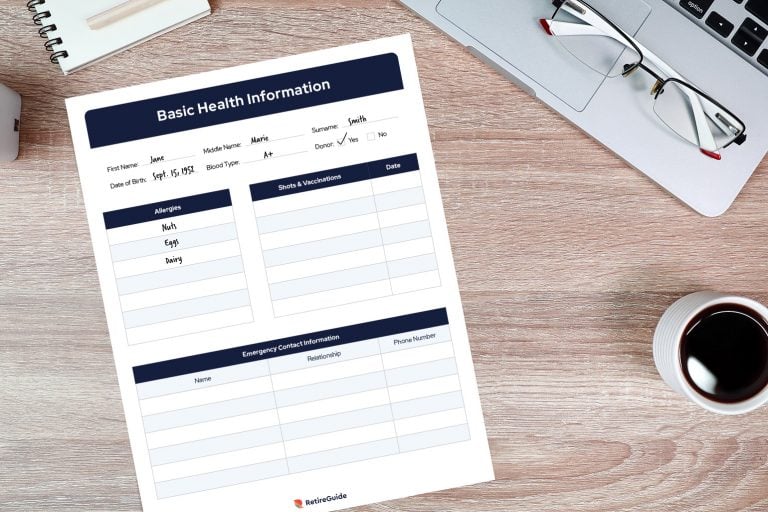
Medicine Chart
According to a study conducted by Consumer Reports, more than 50 percent of Americans have an average of four prescription pills. This information is vital for doctors, as some medications may cause bad reactions to other medications.
If you’re an older adult, have a chronic condition or were recently injured, it can be especially beneficial to write down the medications you take. Knowing the exact prescription can easily help doctors determine if a new medication will interact negatively with the ones you already take regularly.
Likewise, if you’ve documented past medications other providers have given you, you’ll be better prepared to explain what has worked previously and what hasn’t. This can eliminate the experimentation period and help your new doctor find the medication that will work best for your situation.
Use the below medicine chart template to track your current and previous medications.
You may also decide that tracking when you take your medication would be helpful. You can do this using a printable medication tracker, a device specifically made for medication tracking or an app. Such apps include Express Scripts, MyTherapy and Medisafe.
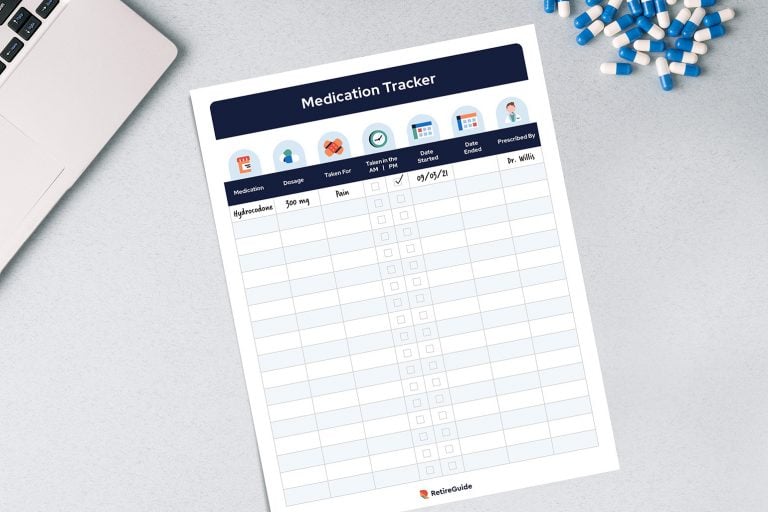
Blood Pressure Tracker
One of the most valuable medical binder printables to have in your health binder may be a blood pressure tracking sheet. According to the Mayo Clinic, hypertension — or high blood pressure — can slowly damage your body over time without presenting any symptoms for years.
Your blood pressure can impact your quality of life but could also leave you with a disability, stroke or possibly death if not monitored regularly. According to the Centers for Disease Control, hypertension was the cause of death for almost 500,000 people in the U.S. in 2019.
By keeping track of your blood pressure levels regularly, you can mitigate the risk of some unknown health problems. Consider tracking your levels daily, perhaps at the same time each day, so you get in a routine.
The Mayo Clinic advises you to check your blood pressure in the morning before taking medication or eating, and again at night before going to bed. They also recommend getting at least two or three readings for accuracy purposes.
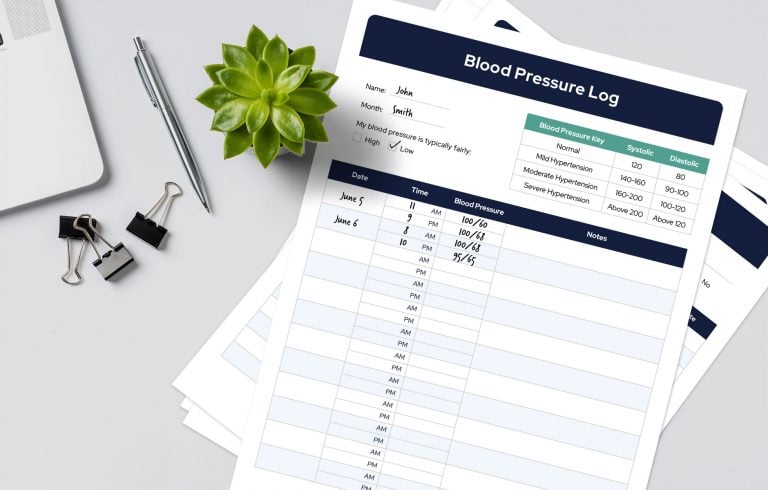
Appointment Tracker
The goal of an appointment tracker is to record when you have medical appointments and what is said or advised in your meeting. By doing this, you can easily track your progress toward a healthier life. You’ll also be able to see how long it takes for the advice given to work or if you should get a second opinion.
Similarly, appointment trackers can be beneficial if you’re ever in a situation where you can’t take care of yourself. You, or whoever is caring for you, would know exactly what has been advised by your health care providers and how long they recommended you do it.
Use the free printable appointment sheet to track each medical appointment. This can include trips to the dentist, your annual wellness visit, physical therapy sessions or any other health-related appointment.
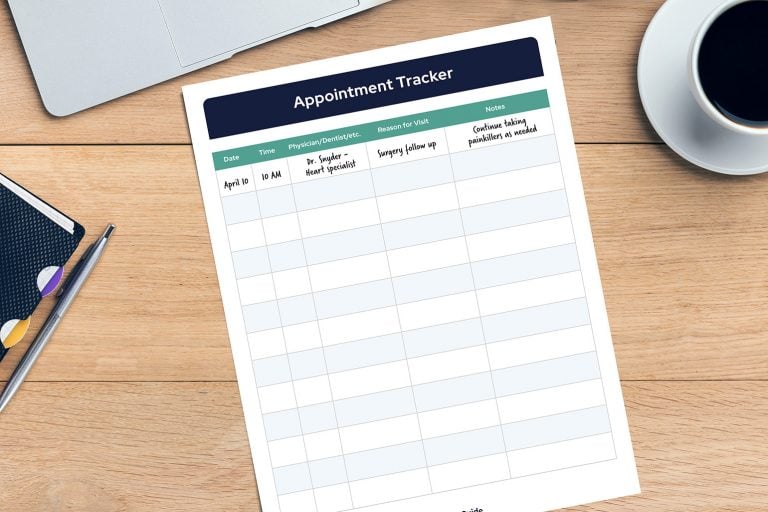
Contact Information
In the event of an accident or crisis, whether large or small, chances are you would want your loved ones to have emergency contact information easily accessible. This would allow you to contact the correct people without losing precious time searching for phone numbers.
It’s very likely that your loved ones would appreciate the same forethought. Having phone numbers and addresses for the healthcare providers who can do the most good can bring a sense of security and relief, even in times of panic.
Contact information you should have readily available:
- Emergency contact
- Nearest hospital address and phone number
- Primary care physician
- Specialty physicians
- Caregivers and the agency they work for
- Therapists
- Dentist
You can also include a list of potential providers in your area if your primary doctor, dentist, therapist, etc. isn’t available.
This is especially important for those who receive Medicare benefits. Keeping a running list of participating providers in your area can help you avoid having to pay large out-of-pocket costs by going to a provider who doesn’t accept assignment.
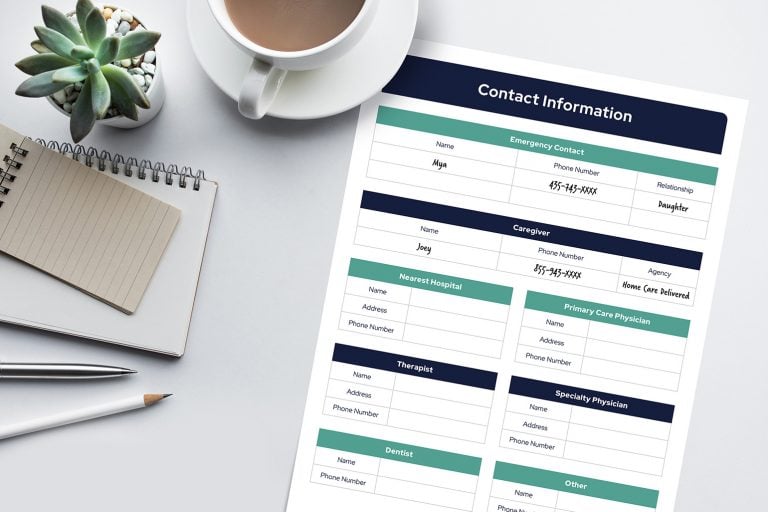
Symptoms and “Other” Tracker
There are a variety of other health-related aspects of your life that may be helpful to keep track of. For example, after suffering from an injury or experiencing unexplainable pain, it can be helpful to keep track of how long it lasts and under what circumstances you experience it.
Likewise, if you have trouble sleeping, it’s a good idea to track when you fall asleep each night, what time you wake up and possible circumstances that explain those details.
As your life changes, your medical needs will as well. Keep a general tracker on standby that you can use for any one of the following:
- Pain
- Mental health levels
- Blood sugar
- Sleep
- Migraines
- Irregular bowel movements
- Exercise
- Water intake
Tracking your symptoms or other aspects of your health can help both you and your doctor understand them better.
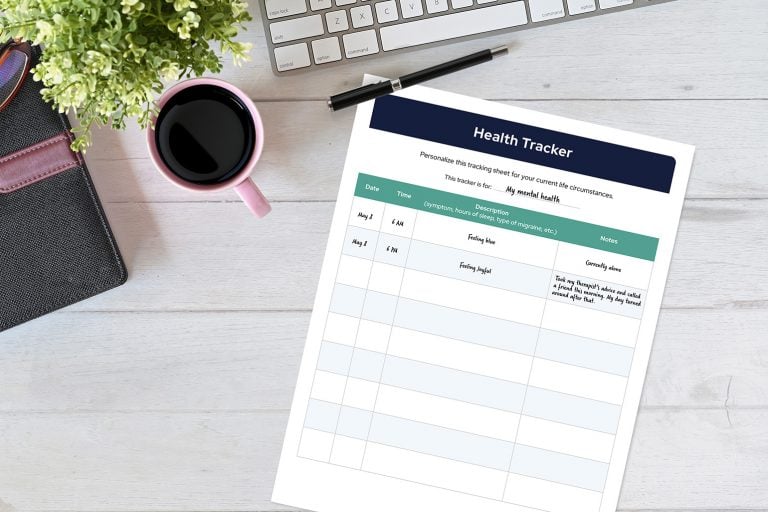
Additional Information To Keep In Your Binder
Aside from the previously listed medical binder printables, there are many other documents you can — and should — keep together. Include additional information in your medical binder that will help paint the whole picture of your health. Among those things are:
- Insurance information
- Medical receipts
- Optometry prescriptions
- Previous test results/pathology reports/X-rays/etc.
- Helpful articles you’ve found online or been given by your doctor
- Living will
- Medical power of attorney
Keeping your insurance information in your binder is one way to prevent misplacing it. Consider putting all of your medical policies and cards here, including those for your health, dental, vision and life insurance.
Not only will you rest easy knowing all your information is available whenever you need it, but you’ll also be able to quickly identify if certain details on your insurance policies or medical power of attorney are missing.
Those who benefit from Medicare should also consider including online account information in their binder as well as other valuable documents like a living will or trust account information.
How Often Should You Update Your Binder?
Update your binder at least once a year, but you should also update it when anything significant happens to your health. Some documents will need to be updated more regularly — as often as once a day — but documents like your contact info and basic health details won’t require that much upkeep.
To ensure you remember to update your binder, mark a specific date on your calendar or add it as a to-do during your spring cleaning.
Keeping a medical binder brings tremendous benefits. Not only will you be able to find the information you need without having to dig through file after file, but you’ll also be better equipped to handle emergencies that come along. If you’re unsure what specific information you should include, talk with your healthcare provider, Medicare advisor or other insurance agent who can provide further guidance.
By using these medical binder printables, you’ll be well on your way to getting all your health information gathered and in one easy-to-find location.
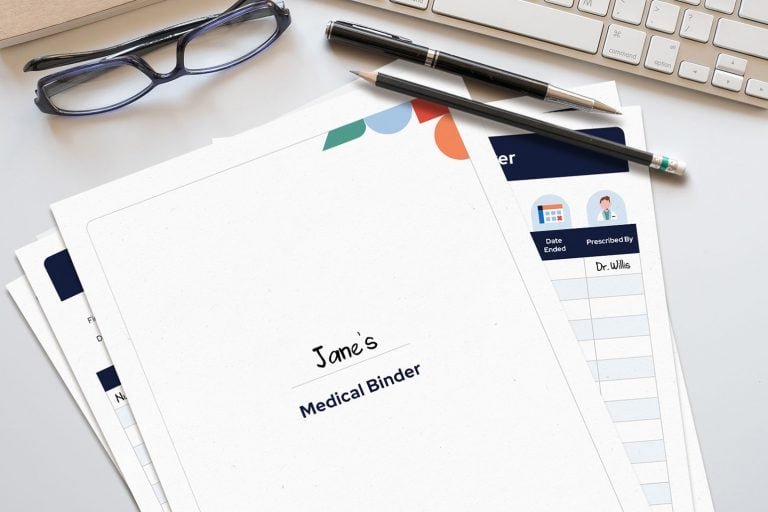
Calling this number connects you to one of our trusted partners.
If you're interested in help navigating your options, a representative will provide you with a free, no-obligation consultation.
Our partners are committed to excellent customer service. They can match you with a qualified professional for your unique objectives.
We/Our Partners do not offer every plan available in your area. Any information provided is limited to those plans offered in your area. Please contact Medicare.gov or 1-800-MEDICARE to get information on all of your options.
866-749-5443Your web browser is no longer supported by Microsoft. Update your browser for more security, speed and compatibility.
If you need help pricing and building your medicare plan, call us at 844-572-0696





